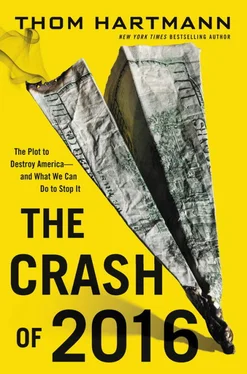It’s simple to understand why. When you take money out of the hands of working people, as austerity does, then they don’t have as much money to spend in the economy, and everything slows down. When people have smaller paychecks, the government is then collecting even less revenue, thus making deficits worse.
The real reason why austerity was enacted is so that the finite number of euros left in places such as Greece and Italy, as well as in Spain and Portugal and others, would without a doubt wind up in the hands of the wealthy.
In Greece, they lost their health care system. In July 2011, the Royalists in technocratic suits put up some of their demands. They said they’d give Greece a bailout to ward off complete collapse, but in return they wanted a big chunk of the money that was being used to treat sick Greek citizens.
And for the first time, unemployed Greeks who had lost their health benefits now had to pay out of their own pocket for any medical care they needed.
As Dr. Kostas Syrigos, the head of Greece’s largest oncology department, told the New York Times , “We are moving to the same situation that the United States has been in, where when you lose your job and you are uninsured, you aren’t covered.”
Today, that’s the case for roughly half of Greece’s 1.2 million long-term unemployed workers.
One of those unemployed workers is a woman named Elena who was diagnosed with breast cancer a year ago, but under the new Greek law could not receive any medical care because her benefits had expired and she had no money. Without treatment, her tumor grew to the size of an orange and broke through her skin, leaving a gaping wound. At this point, any sort of medical treatment for Elena was hopeless.
After seeing Elena, Dr. Syrigos told the Times , “Things like that are described in textbooks, but you never see them because until now, anybody who got sick in this country could always get help… In Greece right now, to be unemployed means death.”
And these death sentences are ordered by technocrats, who are coldly overseeing massive transfers of wealth from the hands of the people to the hands of the Economic Royalists. They won’t settle until all of Greece is turned into Europe’s Disney World and the Coliseum and Parthenon are Lloyd Blankfein’s new mansions.
These events in Europe prompted New York Times editorialist Ross Douthat to make this observation about the theft of democracy in an op-ed in November 2011 titled, “Conspiracies, Coups and Currencies.” He wrote, “[F]or the inhabitants of Italy and Greece, who have just watched democratically elected governments toppled by pressure from financiers, European Union bureaucrats and foreign heads of state, it evokes the cold reality of 21st-century politics. Democracy may be nice in theory, but in a time of crisis it’s the technocrats who really get to call the shots [italics added].” 131
When the people of Greece saw Papandreou ousted, most were unaware of the bigger picture of what was happening all around them.
Similarly, most of us in the United States were equally ignorant when, in 2008, despite the switchboards at the US Capitol crashing under the volume of phone calls from constituents urging a “no” vote, our elected representatives voted yes at the behest of Bush’s treasury secretary, Henry Paulson, and jammed through the biggest bailout of Wall Street in our nation’s history.
Steadily—and stealthily—Goldman Sachs and other banking elite were carrying out a global coup d’état.
There’s one tie that binds Lucas Papademos (the man who replaced Papandreou in Greece in 2011), Henry Paulson in the United States, and other prominent technocrats in important financial posts around the world, and that’s Goldman Sachs. All were former bankers and executives at the Wall Street giant, all assumed prominent positions of power, and all played a hand after the global financial meltdown of 2007–08, thus making sure Goldman Sachs and the rest of the Wall Street ilk weathered the storm and made significant profits in the process.
The British newspaper The Independent reported in early 2012 that conservative technocrats who are currently steering or who have steered postcrisis fiscal policy in Greece, Germany, Italy, Belgium, France, and now the United Kingdom all hail from Goldman Sachs. In fact, the head of the European Central Bank itself, Mario Draghi, was the former managing director of Goldman Sachs International.
And here in the United States, after Treasury Secretary and former Goldman CEO Henry Paulson did his job in 2008 securing Goldman’s multibillion-dollar bailout, he was replaced in the new Obama administration by Tim Geithner, who worked very closely with Goldman Sachs as head of the New York Fed and made sure Goldman received more than $14 billion from the bailout of failed insurance giant AIG. 132
As the Daily Kos summed it up in November 2012, “The normal scenario usually involves helping a nation hide a problem and sell its debt until the problem blows up into a bubble that bursts in a spectacular way… Goldman Sachs then puts their ‘man’ into a position of power to direct the bailouts so that Goldman gets all its money back and more, while the nation’s economy gets gutted.”
We no longer have an economy that’s geared to benefit working people around the world; we have an economy that’s geared to exploit them for Wall Street profits.
Trader Alessio Rastani told the BBC 133in September, before Goldman’s Lucas Papademos was installed as Greece’s prime minister, “We don’t really care about having a fixed economy, having a fixed situation, our job is to make money from it… Personally, I’ve been dreaming of this moment for three years. I go to bed every night and I dream of another recession.”
Rastani continued, “When the market crashes… if you know what to do, if you have the right plan set up, you can make a lot of money from this.”
And as we’ve seen over the last decade, the bankers know exactly what to do. They’ve had the right plan set up, and it’s nothing short of a global coup d’état.
As Rastani bluntly told the BBC, “This is not a time right now for wishful thinking that governments are going to sort things out. The governments don’t rule the world, Goldman Sachs rules the world.”
The people of Michigan know very well what the people of Greece are going through.
What’s disguised as technocracy in Europe is a shadow corporate government in the United States (described in chapter 8), steadily working to undermine our current democratic government. And, just like in Europe, making sure that whatever wealth is left postcrisis gets sucked up by the Royalists.
I was speaking to Reverend David Bullock, the president of the Rainbow/PUSH Coalition in Highland Park, Michigan, about what life is like under Governor Rick Snyder’s new “Emergency Financial Managers” law.
The law—which has technically been on the books since the late 1980s, but was broadly expanded in 2011 when Republican Rick Snyder took over as governor—allows the governor of Michigan to appoint “financial managers” to take over cities that are struggling in the wake of the financial crisis.
These financial managers selected by Michigan’s governor are typically paid six-figure salaries and have enormous power. They can fire local elected officials, stripping entire populations in places such as Highland Park of their voice, and their vote, to determine the best policies for their own community.
They can break contracts, especially union contracts with local police, firefighters, and teachers. They can sell off the city’s assets—the commons—to corporate interests at a fire-sale price, such as what happened in the city of Benton Harbor. There, under the control of a “financial manager,” a ninety-acre Lake Michigan waterfront park (a part of the commons that’s enjoyed by mostly low-income kids in a minority neighborhood) was sold off to real estate developers, who wanted to build a golf course resort for the affluent white neighborhood across the river. And worse, Governor Snyder’s managers can completely redo local budgets without any input from local elected officials.
Читать дальше












